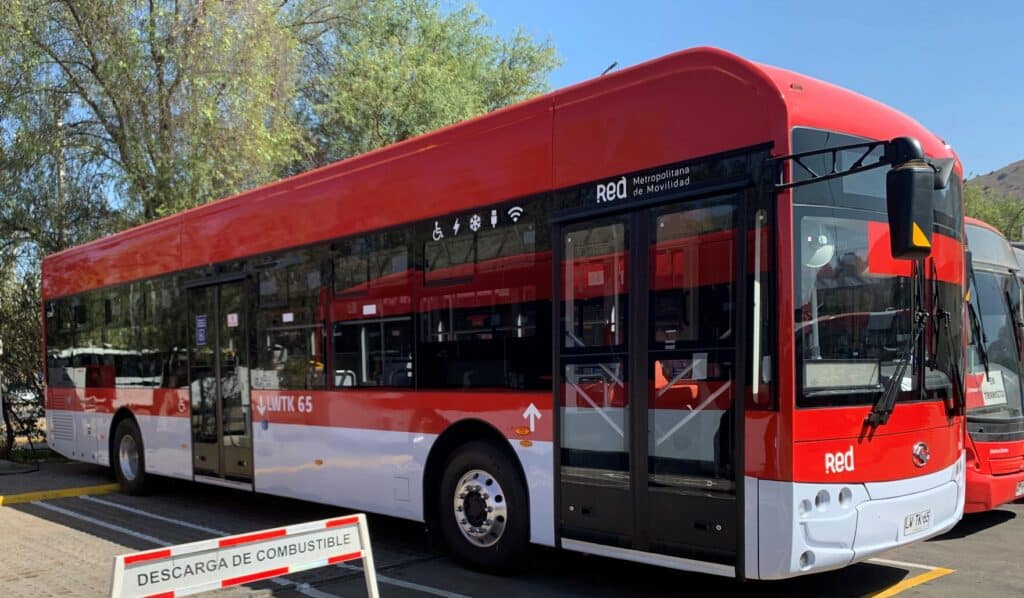Overview
Electric buses introduce a range of challenges to public transportation operations. To ease the transition from diesel to electric, RBU Santiago, a Transdev operation in Chile, turned to Optibus to leverage our advanced optimization algorithms and artificial intelligence to create the plans and schedules for 245 new e-buses.
Rainier Rojas, Director of Operations, RBU Santiago
Background
Santiago, Chile is home to 7 million inhabitants, making it one of the largest cities in North and South America. It is also one of the most polluted cities worldwide. The Chilean authorities have initiated a variety of measures to combat poor air quality, such as reducing emissions from the public transportation sector. Electric vehicles are a major part of that solution. Chile has ambitious plans to put 1,900 e-buses on the road in Santiago in 2023 and establish a 100% electric fleet by 2040.
In light of those goals, Santiago has one of the largest electric bus fleets in Latin America and is leading the region’s transition away from diesel vehicles. But the successful roll-out of electric bus fleets is more complicated than simply putting EVs on the road. Electric buses come with complex specs that disrupt existing schedules and routes, be it changes in the duration and frequency of charging versus fueling up, charger location and type (slow versus fast charging), energy costs, the effect of weather and topography on battery discharge rates, and more. Many cities also struggle with a lack of charging and energy infrastructure.
RBU, one of Santiago’s main public transportation operators, chose Optibus’ software to support them in their transition to a fully-electric fleet, and in doing so, achieved some excellent results.
Challenges & Solution
Using Optibus’ EV scheduling software to create the operational scenario for 245 electric vehicles
RBU Santiago will add 220 electric buses to their operation in 2023. The company wanted to prepare early on for a range of EV-specific scenarios and challenges that may arise, including a lack of chargers, governmental restrictions on charging times, and the high cost of overnight charging.
After a 6-month implementation period with Optibus, RBU Santiago was already able to efficiently operate 25 electric buses. Using Optibus’ artificial intelligence and optimized algorithms, they have also already created the operational scenario for the full electric fleet of 245 vehicles, so that, as soon as the buses are delivered, the entire electric operation is set up and ready to roll out.

“Optibus’ EV scheduling software underpins our strategy for transitioning away from diesel vehicles. The software catches potential service disruptions and operational risks early on, and alerts us instantly so that we can fix those and ensure our electric buses run smoothly,” said Rainier Rojas, Director of Operations at RBU Santiago.
The early introduction of electric vehicle scheduling software – even before the buses have arrived – puts RBU Santiago ahead of the game. They can make smart decisions and create multiple scenarios for different variables that may arise, be it charging time, battery duration, charger location and availability, energy costs, and more. Using the Optibus platform to design the most efficient EV operation, RBU Santiago’s 245 electric buses will avoid 2,096.7 tons of CO2 emissions per month.
Rainier Rojas, Director of Operations, RBU Santiago
In line with Santiago’s vision to become a cleaner, less polluted city, RBU Santiago’s roll out of Optibus’ cloud-native solution eliminates the need for on-premise hardware and IT infrastructure. This enables RBU’s team to work remotely, reducing the company’s commute-related CO2 emissions.
Using Optibus’ Planning product, RBU Santiago also overcame charging prohibitions regarding the industrial use of electricity at peak times. With the help of the platform’s optimization power and capacity for unlimited parameters, RBU Santiago can factor in the charging and discharging of buses’ batteries on ramps and set rules to ensure that schedules observe minimum battery charge requirements, leading to a longer battery life.
“Optibus is our partner in innovation and in offering reliable, sustainable public transportation to the people of Santiago, Chile. The software has taken care of many of the logistical headaches involved in planning and scheduling for electric buses. That saves us time and resources, and lets our staff focus on other important initiatives, “ said Rainier. “The transition to electric buses is about to get a lot easier for the whole industry.”
- RBU Santiago, a Transdev operation
- 92M annual passengers
- Operational scenario for 245 electric buses
- Reduced 2,096 tons of CO2 emissions per month
- Products: Planning, Scheduling, Rostering, EV Scheduling
- Public transportation operator